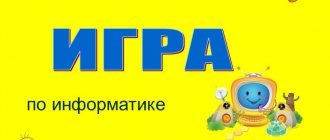Didactic material on technology for indivisible classes
The use of game situations in the learning process encourages students to subordinate their actions, feelings, and thoughts to the goal. During the game, discipline and respect for the work of adults are developed. The most important thing in the game is solving the problem, where students are interested not only in the final result, but also in the solution process itself. Solving crosswords and puzzles not only helps students consolidate the material they have learned, but also broadens their horizons and vocabulary. Solving crosswords and puzzles helps to activate students’ cognitive activity, develop memory and thinking.
Crossword puzzle on the topic “Classification of steels. Heat treatment of steels"
Class: 7
Section: “Metal processing technology. Elements of Mechanical Engineering"
Horizontal questions:
1. Physical property of steel. Ability to pass current.
4. Technological property. The ability to begin to take on a new form under the influence of external forces.
5. Chemical properties of steel. The ability not to oxidize at high temperatures.
9. One of the harmful chemical elements that negatively affects steel.
10. Useful chemical element. Determines the strength, toughness and hardenability of steel. Increases the hardness of steel, but increases brittleness and reduces ductility.
12. Useful chemical element. Improves the strength characteristics of steel, makes it heat resistant, and increases hardness. But it makes welding difficult.
13. The ability of steel to change shape under load and retain it after the load is removed.
14. Chemical properties of steel. The ability of a substance to combine with oxygen and water. Rust forms.
Vertical questions:
2. Thermal effect on the workpiece: heating and holding at a certain temperature and subsequent cooling.
3. Property of steel. The ability of a material to withstand external loads without breaking.
6. A useful chemical element, which, when contained in steel from 0.3% to 35%, increases its hardness and strength.
7. A type of heat treatment in which the workpiece is cooled slowly and together with the furnace.
8. One of the harmful chemical elements that increases the brittleness of steel.
11. The ability of steel to resist the penetration of other bodies into it.
15. An alloy of iron with carbon and other chemical elements.
Answers:
Horizontally: 1. Electrical conductivity. 4. Malleability. 5. Heat resistance. 9. Nitrogen. 10. Carbon. 12. Molybdenum. 13. Plasticity. 14. Oxidability.
Vertical: 2. Heat treatment. 3. Durability. 6. Chrome. 7. Annealing. 8. Oxygen. 11. Hardness. 15. Steel.
All material - see the document.
Digital teaching materials
What are didactic materials in electronic form?
Didactic material
is material that activates the student’s cognitive activity, encouraging him to get involved in the educational process, perceive information, and think about a given topic. The didactic principle itself implies progression from simple to complex through tools that are optimal for a particular student.
Electronic didactic material (EDM)
is a digital manual that allows you to influence the student in accordance with his characteristics of perception and offer him work of a suitable level of complexity. These are the same maps, tables, illustrations, as well as video and audio materials - convenient for storage, accessible for homework, supplemented with interactive elements.
Didactic materials in electronic form are used not only through computers, phones, tablets and other personal digital devices, but also together with paper publications, in the form of front-line work. Moreover, the use of digital aids in our realities most often occurs through interactive whiteboards or simple projectors, which is taken into account by developers of digital educational resources.
Enjoy English. English with pleasure: a textbook for educational institutions. 4th grade
Electronic form of the textbook (EFU) Enjoy English. English with pleasure: a textbook for educational institutions. 4th grade is included in the educational and methodological set (UMK) in the subject English language 4th grade Biboletova M.Z. Denisenko O.A. Trubaneva N.N. Enjoy English. English with pleasure: a textbook for educational institutions. Grade 4 meets the requirements of the Federal State Educational Standard. EFU is recommended by the Ministry of Education and Science of the Russian Federation.
Buy
EDM in individualization of education
Electronic didactic materials help teachers implement the individualization of the educational process.
Directions of individualization:
- Content (what topics are offered to a particular student).
- Volume (level of complexity of the material).
- Time to study.
The peculiarity is that in the process of working with didactic aids, it is necessary to help the student become familiar with the largest amount of material, but the study time should be strictly limited. In essence, didactic materials create starting points, activation points, which the child remembers and uses further in independent work, spending as much time as he needs.
Types of information at “activation points”:
- Visual.
These are video materials, interactive maps, animation and others. For individualization, the teacher can stop the video at a key frame and leave it on the board so that each child can examine an important fragment and record it in memory in a way that is convenient for him. Also, digital teaching materials are used by children in homework at an individual pace.
- Practical.
Assignments in digital format make it possible to differentiate tasks depending on the needs of students, as well as to analyze material that is important for all students in a frontal mode.
Digital educational resources of the Russian Textbook Corporation
The Russian Textbook Corporation presents digital teaching materials in the free service for teachers “Cool Work”. This service is part of the LECTA educational platform, which also hosts the largest catalog of electronic textbooks, test materials, VPR simulators, courses for teachers and much more.
The “Classwork” service includes ready-made educational materials and presentations for the lesson, additions to well-known teaching materials, a basis for calendar and thematic planning, a constructor for creating your own presentations, the ability to edit and supplement materials, optimization for working on an interactive whiteboard. The authors of the textbooks collected in “Classwork” the didactic materials necessary for the lesson (both visual and practical), arranged them in the optimal sequence, and supplemented them with methodological recommendations. The service is currently developing, and by the end of the coming school year, the catalog of lessons will contain materials on all the main topics of the school curriculum.
You can study free educational materials from our authors right now. To do this, just register on the Lecta.ru website and find the necessary working programs in the extensive catalog.
Go to Lecta
Mathematics. 6th grade
Electronic form of the textbook (EFU) Mathematics.
Grade 6 is included in the educational and methodological set (UMK) in the subject of Grade 6 Mathematics Merzlyak A. G. Polonsky V. B. Yakir M. S. Mathematics. Grade 6 meets the requirements of the Federal State Educational Standard. EFU is recommended by the Ministry of Education and Science of the Russian Federation. Buy





